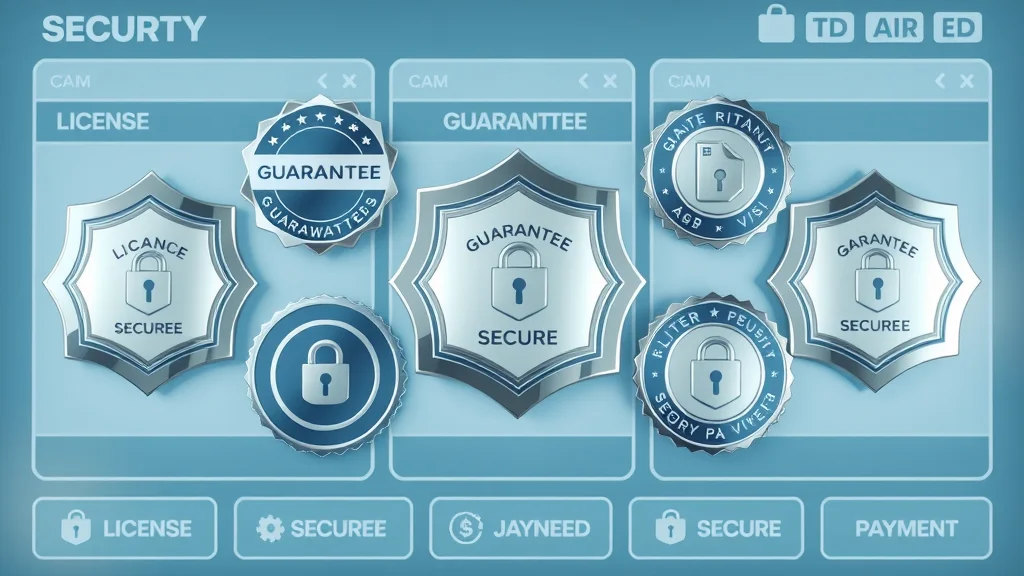Did you know that more than 80% of homeowners decide which contractor to contact before ever picking up the phone? In today’s digital marketplace, a contractor’s first impression isn’t made during a phone call or even at the front door—it’s made online, within seconds. “Trust signals,” the subtle cues that inspire confidence in your business, can turn those online visitors into loyal customers before you ever speak a word. If you’re looking to win more leads, build trust, and grow your reputation, understanding the psychology behind trust signals is your blueprint for success.
A Surprising Fact: The Unseen Power of Trust Signals in Contractor Businesses
Here’s a truth that startles many established contractors: homeowners are shaping their choices long before you ever speak with them. Trust signals—from badges and certifications to authentic reviews—play a silent but potent role in whether you’re even considered. Customers are digitally savvy and associate visual cues, positive social proof, and authoritative accreditations with reliability. This means that your online presence must showcase these trust signals front-and-center to avoid losing prospective customers to competitors who look and feel more credible.

Why Over 80% of Homeowners Decide Before They Call: The Impact of Trust Signals on Customer Choice
Homeowners don’t just browse contractor websites—they scrutinize them. With so many options, over 80% of them make preliminary “yes” or “no” decisions based on what they see on your landing pages before engaging. Features like trust badges, star ratings, customer reviews from major review sites, photos of successful projects, and clear evidence of licensing make customers feel secure and more inclined to reach out. When you effectively display these trust signals, you significantly increase the likelihood of converting casual browsers into real leads. This unseen power of trust underscores why contractors must prioritize visual and social cues throughout their digital presence.
What You'll Learn About Trust Signals
- Understand what trust signals are and why they matter for contractors
- Learn about different types of trust signals, including visual and social cues
- Discover practical strategies to build trust and credibility online
- Identify common mistakes that undermine trust signals
- Access actionable tools to boost your trust signals before a customer ever calls
The Psychology Behind Trust Signals: First Impressions That Convert
The psychology of trust signals hinges on how quickly people form opinions. Research shows homeowners often trust—or distrust—a contractor within seconds of landing on their website. This “gut feeling” is guided by subconscious responses to critical visual cues: are there professional logos? Do satisfied customers share testimonials? Is branding consistent, modern, and reassuring? When these elements align, trust grows and so do your leads.
Why Trust Signals Shape Customer Behavior
Trust signals aren’t just decoration; they’re a primary factor influencing user data, behavior, and decision-making. Homeowners scanning your page instinctively seek signs of legitimacy: memberships in professional organizations, business bureau accreditation, or guarantees for products or services. Seeing these, they feel more secure. Absence or inconsistency—even tiny ones, like a broken badge or a missing review—can seed doubt and push users to search for more trustworthy competitors. Trust signals structure each interaction, quietly guiding online visitors toward inquiry and, eventually, conversion.
“Trust is established in the first seven seconds of a customer visiting your website—long before the first call is made.” – Behavioral Marketing Expert
What Are Trust Signals on a Landing Page?
Trust signals on a landing page are designed to make prospective customers feel confident. For a contractor, this involves a blend of visual, verbal, and structural elements—think trust badges, user-generated content, certifications, and clear privacy assurances. Showcasing these signals establishes trust and separates your business from less credible competitors. A well-optimized landing page prioritizes these cues, so visitors can instantly see you are legitimate, capable, and recommended by others.

Trust Signal Essentials: The Critical Elements Every Contractor Website Needs
Some trust signals are must-haves on contractor websites. These include easily visible trust badges showing relevant certifications, customer review widgets or testimonials, association logos (like the Better Business Bureau), and up-to-date photos of real team members or job sites. Including these on your landing page builds trust fast—ensuring that potential clients feel more secure and are motivated to reach out to you rather than drifting to a competitor’s site.
How Trust Signals Increase Conversion Rates
High-quality trust signals correlate strongly with higher conversion rates. Websites showcasing trust bars, positive reviews, and third-party accreditations typically double—sometimes even triple—their inquiries and lead generation. This effect isn’t limited to first-time visitors: returning users are more likely to convert if they consistently encounter strong trust cues. Implementing trust signals builds trust not just once, but over time, nurturing long-term customer relationships and improving your return on investment in digital marketing.
| Trust Signal Type | Examples | Impact on Lead Generation |
|---|---|---|
| Trust Badges | BBB, Licenses, Security badges | +32% conversion rate |
| Customer Reviews | Google, Yelp, Houzz reviews | +25% inquiries |
| Visual Cues | Photos of staff, actual project images | +18% engagement |
| Social Proof | User testimonials, case studies | +20% form completions |
Types of Trust Signals Contractors Must Use
Contractors need to deploy a mix of trust signals to connect with various segments of their customer base. Understanding the types of trust signals—and their roles—is crucial. These range from instant, visual cues to deeper, social and authority-based signals. Implementing a varied approach helps your business appear credible to every visitor, whether they’re scanning for logos or diving into detailed customer feedback before making a decision.
Visual Trust Signals: Building Trust at a Glance
First impressions are often formed visually. Contractors should use recognizably designed trust badges, awards, and certifications prominently. These trust signals are effective because users process visuals faster than text: a star rating or “Licensed & Insured” icon can establish authority in a split second. Striking, up-to-date job site images and branded uniforms reinforce professionalism. Using a cohesive color scheme and modern logos further supports the perception you are current, detail-oriented, and trustworthy.

Social Proof and Customer Feedback: Trust Signals from Real Experiences
Social proof is one of the most powerful types of trust signal, directly impacting whether prospective customers feel comfortable reaching out. Transparent display of customer reviews, user-generated photos, and testimonial videos adds authenticity. Sites that regularly highlight positive reviews and case studies create a ripple effect—encouraging hesitant visitors to see what satisfied customers already enjoy. Integrating social media feeds or links to review sites provides even more context. The result: greater trust, increased engagement, and boosted conversion rates.

Trust Bars and Trust Symbols: What Works on Product Pages
A trust bar—a dedicated row or section showcasing aggregated trust signals—does wonders to build confidence on service or product pages. These bars typically display certifications, guarantee logos, trusted payment icons (such as credit card security), and affiliations with leading professional organizations. Placing this bar at the top or bottom of a page ensures it’s seen without disrupting the browsing experience. Trust bars efficiently condense your credibility into a single visual statement that users can rely on for assurance, especially when deciding to contact or hire you.
Authority & Certifications: Creating Strong Trust Signals with Third-Party Validation
No trust signal is stronger than one provided by a respected third party. License numbers, business bureau ratings, industry certifications, and awards validate your expertise and compliance with standards. Featuring these on your site and service pages builds trust by showing you’re accountable and endorsed by established authorities. This validation is especially important for contractors where the implication of risk is high—customers want to know you have the right credentials and will stand by your work.
How to Show Trust Visually: Design and Imagery Matter
Compelling imagery and careful site design build trust before visitors read a single testimonial. Professional headshots, crisp images of actual employees, and photos of finished work humanize your business and build trust. Consistent branding, proper use of color psychology, and clean layouts prevent confusion and reinforce professionalism. Avoid overused stock images—real, relatable visuals outshine them every time and make your trust signals believable, not generic.
Best Practices for Displaying Trust Signals on Contractor Websites
Strategic placement is key: feature trust badges “above the fold,” display reviews on every service page, and use a sticky trust bar for ongoing reinforcement. Make sure each signal links to verification (for example, clicking a BBB badge takes users to your profile). Refresh visuals and update testimonials regularly—this tells visitors your business is active and maintains standards. Prioritize clarity and authenticity: mixed messaging or out-of-date content undercuts trust and credibility fast.

Photos and video spotlight your transparency, letting users peek into your business before contacting you. Conduct quick walk-through videos of completed projects or capture short client interviews as testimonials—real faces and real stories drive social proof. Keep these visuals high-quality and authentic; shaky, low-light, or staged footage lessens impact. A blend of project portfolios and satisfied customers on camera builds trust that’s impossible to fake, especially when combined with written customer feedback.
Social Proof: Building Trust Through Reviews and Testimonials
Social proof is foundational for contractors aiming to win customers before a call. Homeowners trust what others say and often compare feedback across review sites before reaching out. Regularly updated testimonials, star ratings on service sites, and extensive case studies provide real evidence that you deliver as promised. User-generated photos and project stories add depth beyond basic reviews, creating a credible, engaging resource that demonstrates consistent satisfaction among your clients.
How Customer Feedback Drives Trust Signals
Customer feedback shapes trust perceptions swiftly. When site visitors see authentic reviews, detailed testimonials, and case studies matching their own needs, they gain assurance you understand and solve real-world challenges. Highlighting user-generated content—like before-and-after project stories—further demonstrates your capability. This doesn’t just boost trust; it makes your service relatable and memorable. Contractors who invite feedback and make it easy to find quickly separate themselves from competitors lacking proof of performance.
- Reviews
- Testimonials
- Case Studies
- User-Generated Content
Trust Symbols: Icons, Badges, and More
Trust symbols distill credibility into universally understood images—think lock icons for security, trophy icons for awards, or “Verified Contractor” stamps from recognized organizations. These immediately communicate reliability and compliance, making customers feel more secure. Real trust symbols are always earned or validated—avoid using unrecognized icons or generic art that could undermine your legitimacy.
The Role of Security, Licensing, and Guarantee Badges as Trust Signals
Security, licensing, and guarantee badges are critical for contractors. Displaying these next to forms or calls-to-action triggers confidence: users know their user data is protected, your business is legitimate, and their investment is covered. Examples include secure credit card processing badges, state or city license numbers, and satisfaction guarantees covering your products or services. Integrating these into your design makes the trust signals impossible to miss, directly boosting inquiry and conversion rates.

Trust Bars: The Subtle Trust Signal That Converts
A trust bar is a high-impact, low-effort way to build trust on every website visit. Contractors can increase conversion rates by consolidating their most important trust signals—awards, certifications, and partnerships—in a horizontal bar placed in the header or just above a call-to-action. This constant visibility keeps credibility top-of-mind, especially when visitors are comparing multiple businesses or products or services.
Where and How to Display Trust Bars on a Landing Page
Place trust bars at the top for instant visibility, or near inquiry forms where they reinforce a sense of safety during conversions. Rotate the contents periodically to feature new accolades or recent certifications. Ensure links or “hover” states provide extra verification—this shows transparency and builds trust further. Visual balance is crucial: trust bars should be noticeable but not cluttered or overwhelming, aligning neatly with the site’s primary color palette and branding guidelines.
| Trust Bar Location | Trust Signals Featured | Typical Conversion Rate Lift |
|---|---|---|
| Header (Top of Page) | Certifications, Security | +15-28% |
| Above Contact Form | Guarantee, Customer Reviews | +12-22% |
| Footer (Bottom of Page) | Partner Logos, Awards | +9-16% |
Incorporating Trust Signals on Product Pages
Contractor product pages and service listings benefit when trust signals are deeply integrated. This could mean inserting mini-testimonials, brief “Did you know?” trust bars, or real customer star ratings directly beside each offer. Using trust badges relevant to each trade or service—such as EPA Lead-Safe Certification for painters or manufacturer warranties for roofers—builds “contextual trust” for specific products or services, addressing the exact concerns of discerning homeowners.
How Trust Signals Support Sales on Contractor Service Pages
By embedding relevant trust signals within each service page, you ensure customers feel confident at every step. Sprinkle customer reviews alongside detailed service descriptions, use photo carousels to spotlight before-and-after projects, and pin relevant certifications just above purchase or inquiry buttons. The more tailored and transparent your trust-building efforts, the higher your conversion rates—and the more likely you are to turn a curious visitor into a new client.
Common Mistakes: What Undermines Trust Signals?
Contractors sometimes unintentionally sabotage their trust-building efforts. Using outdated content, inconsistent branding, or stock images that don’t reflect reality can quickly unravel credibility. Failing to highlight up-to-date certifications, showcase recent positive reviews, or respond to customer feedback shows a lack of transparency and professionalism—making it much easier for a homeowner to move on to your competitors.
Outdated Content, Inconsistent Branding, and Overused Stock Images
Stale photos, mismatched logos, or obviously staged “team” shots instantly erode trust. Prospective customers notice these lapses and question whether your business is current or attentive to detail. Consistency is key: from fonts to colors to personality, everything should reinforce your unique value. Most importantly, missing trust signals—like absent badges or a lack of reviews—cause users to doubt your credibility and often drop off without a trace.
- Ignoring Customer Feedback
- Failing to Update Visuals
- Missing Certifications or Reviews
Strategies to Build Trust Before the Call: Actionable Steps
Building trust online is a proactive, ongoing process. Contractors can quickly enhance their digital presence by regularly auditing and updating trust signals. Encourage and showcase customer reviews, invest in professional site photography, and highlight every badge, award, or certification you’ve earned. Use analytics to determine which trust signals drive the best performance and test new placements or formats frequently. The goal is to make prospective customers feel comfortable and confident from their very first site visit—before ever picking up the phone.
Checklist: Optimize Your Trust Signals Today
- Audit your site for active trust badges and certifications
- Refresh customer reviews and testimonials monthly
- Integrate a trust bar in key high-traffic areas
- Update staff and project photos to reflect recent work
- Ensure all signals link to verification pages
- Encourage user-generated content through social media
- Respond to reviews and feedback publicly
Key Takeaways: Mastering Trust Signals for Contractor Success
- Trust signals are a decisive factor for homeowners before they make contact
- Combining visual, social, and authority signals yields the strongest results
- Updating and optimizing trust signals is an ongoing process
People Also Ask (FAQs) About Trust Signals
What are trust signals on a landing page?
Trust signals on a landing page are visual cues, badges, or content—such as testimonials, security seals, and certifications—that help visitors feel confident about engaging with a contractor before making initial contact.
How to show trust visually?
Trust can be shown visually through consistent branding, professional imagery, clear reviews, trust badges, and a well-organized website layout—all reinforcing credibility for contractors.
What are trust symbols?
Trust symbols are graphical elements like icons, certifications, and security badges used to communicate reliability and credentials instantly on a contractor’s website.
What is a trust bar on a website?
A trust bar is a section of a website, typically at the top or bottom, displaying aggregated trust signals such as awards, certifications, or partnerships—helping boost user confidence before they interact further.
Find Out How Strong Your Trust Signals Are—Book a Free Consultation or Text Us at 720.892.5968
Ready to transform your web presence and win more clients? Book a free trust signal audit or text us at 720.892.5968 for expert insights—start building trust before the first call!
 Add Row
Add Row  Add
Add 




Write A Comment